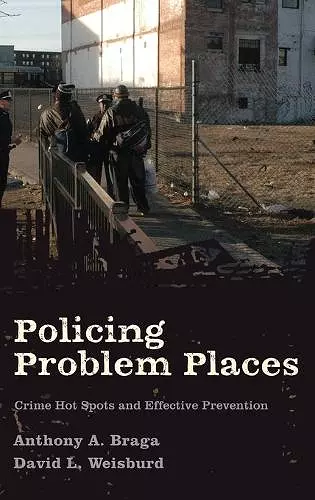Policing Problem Places
Crime Hot Spots and Effective Prevention
Anthony A Braga author David L Weisburd author
Format:Hardback
Publisher:Oxford University Press Inc
Published:28th Oct '10
Currently unavailable, and unfortunately no date known when it will be back

Both those who study crime and those who fight it agree that crime is not spread evenly across city landscapes. Rather, clusters of crime--a few "hot spots"--host a vastly disproportionate amount of criminal activity. Even within the most crime-ridden neighborhoods, crime concentrates at a few locations while other areas remain relatively crime-free. So if police focus their limited resources at these problem places-a practice known as hot spots policing-they will be better positioned to lower citywide crime rates, and do it more efficiently. In Policing Problem Places, Anthony Braga and David Weisburd demonstrate that hot spots policing is a powerful and cost-effective approach to crime prevention. While putting police officers where crime happens most is an old and well-established idea, in practice it is often avoided or not properly implemented. Braga and Weisburd draw on rigorous scientific evidence to show how police officers should use problem-oriented policing and situational crime-prevention techniques to address the place dynamics, situations, and characteristics that cause a spot to be "hot." But the benefits of hot spots policing do not end with conserving public dollars and police resources. Illustrating how policing problem places can benefit police-community relations, especially in minority neighborhoods where residents have long suffered from high crime and poor police service, Braga and Weisburd show how police can make efforts to develop positive and collaborative relationships with residents and avoid the indiscriminant enforcement tactics that undermine the legitimacy of the police. A vital resource for police departments everywhere, Policing Problem Places offers a blueprint for rethinking what police should do and how they should do it.
"Policing Problem Places is a must read for mayors, police executives, and academics alike. This landmark work makes a particularly important contribution by offering a framework to understand and change the underlying conditions that give rise to crime hot spots. Community members, in particular, will appreciate Braga and Weisburd's focus on preventing crime through collaboration and the engagement of policing strategies that are legitimate to the people the police seek to serve and protect."--William Bratton, former Chief, Los Angeles Police Department and former Commissioner, New York Police Department "Policing Problem Places seeks nothing less than a revolution in police organization and practice. While most of the police budget is spent on police patrol, most of that time is wasted on low-crime places. In a clear and engaging style, Braga and Weisburd synthesize three decades of police research around a distinctive and brilliant vision for reorganizing our system of public crime prevention around high-crime places. This will be a widely read and influential book."--Lawrence W. Sherman, Professor of Criminology and Director of the Centre for Experimental Criminology, Cambridge University "Braga and Weisburd make an unequivocal case for a tightly focused emphasis on place in policing. They rehearse the empirical evidence for the relationship between hot-spots policing and crime prevention, but they do more. The authors introduce a critical normative criterion for good policing--legitimacy--that scholars must address and police executives must not ignore. This is the book on smarter and fairer law enforcement."--Tracey L. Meares, Deputy Dean and Walton Hale Hamilton Professor of Law, Yale Law School "This book provides a clarion call to police officers and police leaders everywhere to follow the evidence, to focus on policing places and to reduce crime. It is a recipe book for safer places, less crime, and better policing."--Peter Neyroud QPM, Chief Constable and Chief Executive, National Policing Improvement Agency, UK "The National Academy of Sciences has recommended that the police concentrate their efforts on developing specific strategies to deal with specific problems rather than on the more general strategies of patrol and investigation that had been the core of policing for at least two generations. In this book, Anthony Braga and David Weisburd have shown how to meet this challenge. They have forged a strong connection between sophisticated crime control theory and the existing scientific evidence on policing crime hot spots. The result is a rich, rigorous, and provocative analysis... A must read for both academics and practitioners."--Mark H. Moore, Hauser Professor of Nonprofit Organizations, John F. Kennedy School of Government, Harvard University
ISBN: 9780195341966
Dimensions: 163mm x 236mm x 28mm
Weight: 660g
312 pages